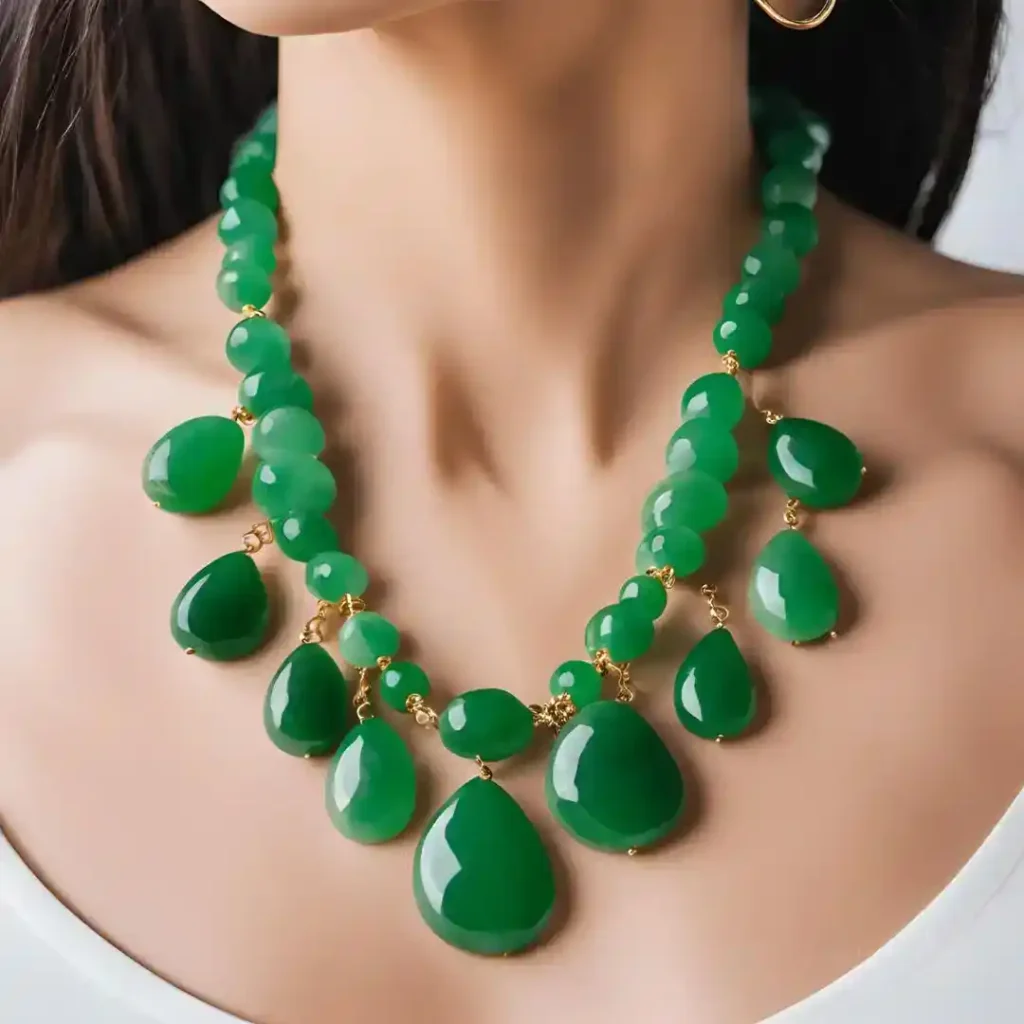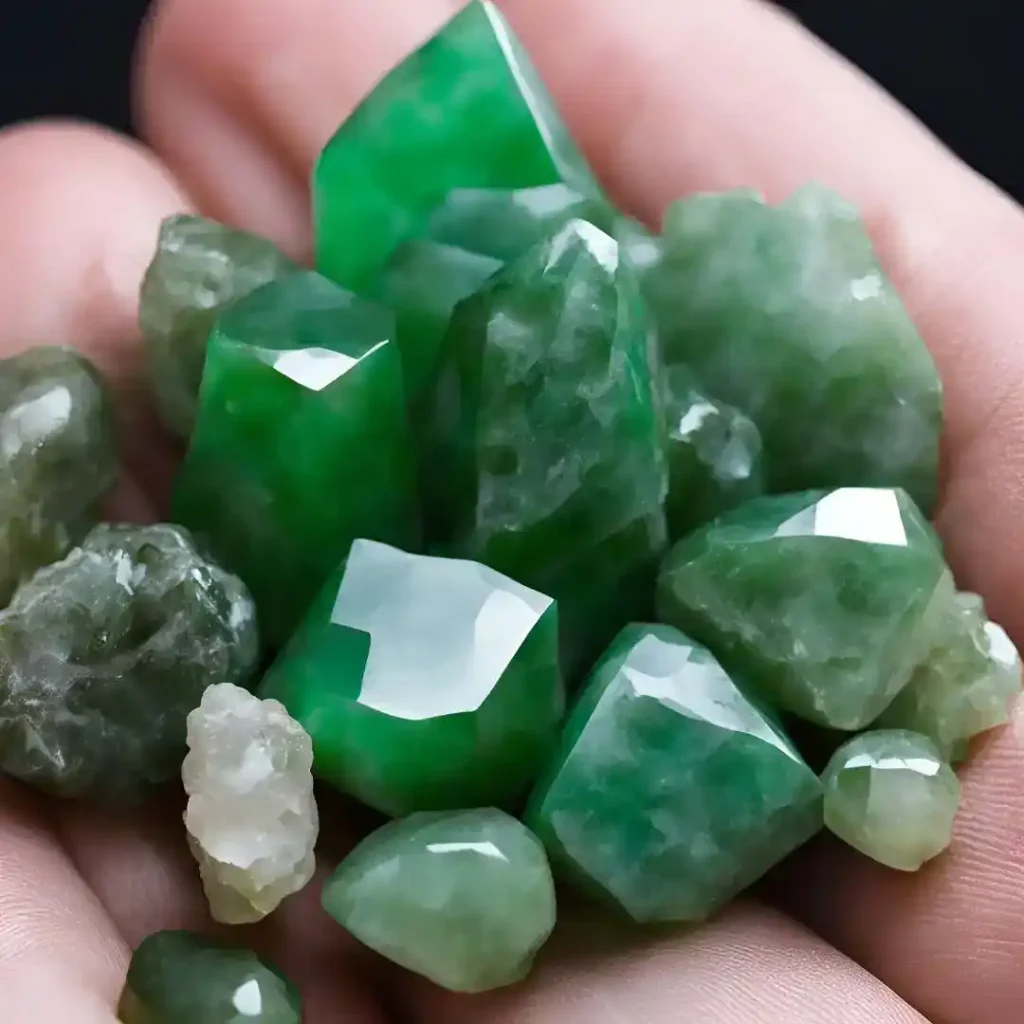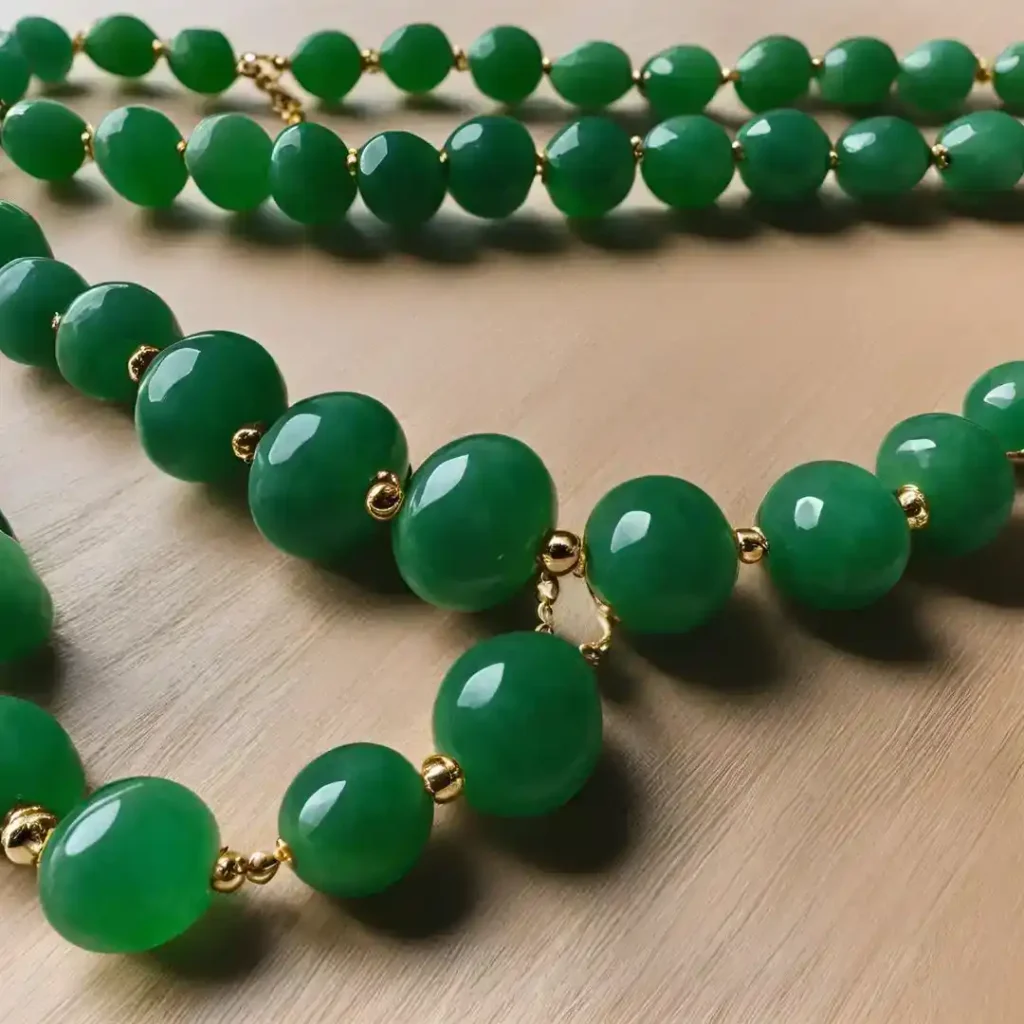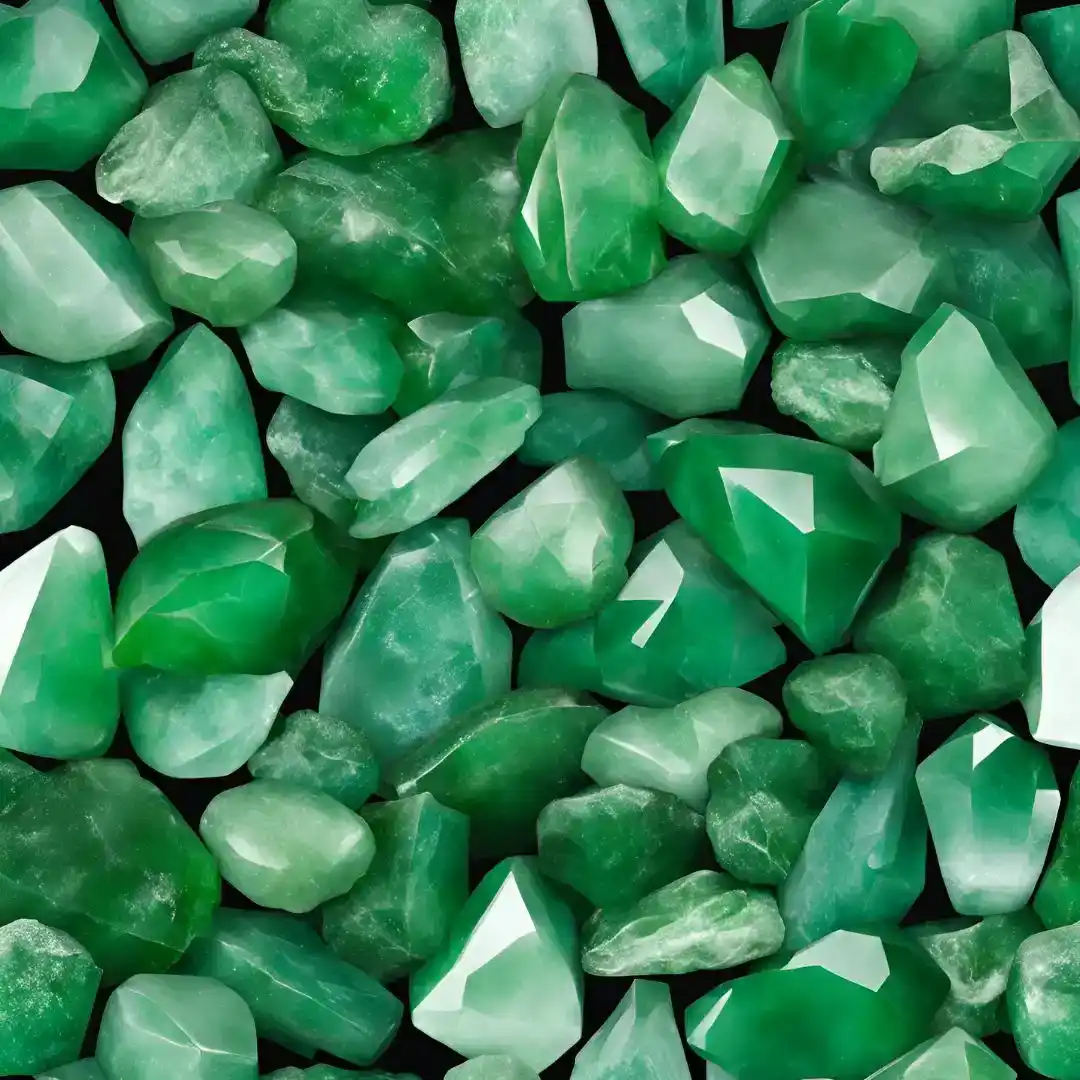Jade, a gemstone revered for its metaphysical properties and spiritual benefits, has long fascinated me as a gemstone expert.
My journey into the spiritual world of studying crystals and natural gemstones began at a young age, and over the past 3 years, I’ve delved into the intricacies of hundreds of crystals, including studying pearls.
However, it’s essential to exercise caution when it comes to certain gemstones, especially Jade.
Not everyone is suited to harness its powers, and there are specific categories of people who should be particularly wary of its side effects.
Through my experience and understanding gemstones, I’ve observed that Jade, despite its numerous benefits, can have unexpected side effects for certain individuals.
This insight is crucial for those venturing into the realm of gemstones, whether for spiritual or aesthetic purposes.
So, let’s explore who should not wear jade and why being informed is vital in this intriguing aspect of the spiritual journey.
Also Read: Elevate Your Style & Fortune: Where To Wear Your Red String Bracelet For Maximum Impact
What Is Jade?
Jade, a stone revered for thousands of years for its deep metaphysical powers, possesses a unique beauty that transcends mere aesthetic qualities.
Its bright green color, often likened to the sun, and smooth texture that seems to almost slip off the hand, are just the tip of the iceberg.
My research into Jade, a combination of nephrite and jadeite, has led me to appreciate its profound spiritual significance across various cultures and regions.
In Chinese culture, it’s known as the imperial stone, while in the East African territory, it’s cherished for its power to restore balance and harmony.
Jade isn’t just a stone; it’s a spiritual essence embodied in jewelry, artifacts, and figurines.
The use of Jade in items like evil eye bracelets is a testament to its ability to channel spiritual energy.
As someone deeply connected to the spiritual world, I’ve felt its intense spiritual frequencies, particularly resonating with the heart chakra.
This connection influences not just our emotions but also our intellect and intuition.
Its spiritual healing properties are profound, yet they vary significantly among individuals, a fascinating aspect I’ve observed in my studies.
Can Jade Be Worn By Anyone?
In my experience with gemstones, I’ve found that jade isn’t universally suitable for every individual.
This unique crystal is known for its metaphysical properties, but it’s crucial to consider that it may not align with everyone’s energy field.
- Healing properties: Jade is often sought for its potential in aiding the recovery process and promoting the healing of the mind. However, not everyone responds positively to these properties. Some individuals may actually fall sick or feel unwell, suggesting a mismatch between their personal energy and the stone’s.
- Spiritual benefits: While many cherish jade for warding off negative energy, bad luck, and evil spirits, there are cases where it might bring discomfort. This is particularly true in peculiar situations or circumstances where an individual’s aura clashes with the energy of the jade.
Remember, the interaction between humans and gemstones like jade is highly relative and varies based on personal circumstances and energy harnessing capabilities.
Also Read: Can I Sleep With My Evil Eye Bracelet On?
Does Jade Have Side Effects?
In the realm of crystals, jade stands out for its profound metaphysical properties and spiritual benefits. However, not everyone is suited to harness these energies.
It’s crucial to have a deep understanding of jade’s side effects, especially if you’re considering it as a source of healing or spiritual growth.
From personal experience and extensive knowledge in crystal therapy, I’ve learned that jade’s energy discharge can be overwhelming for certain individuals.
These conditions fall under 7 categories of people who might experience more harm than good.
This includes those already suffering from emotional turmoil or specific predicaments where the calming nature of jade might exacerbate detachment or disengagement from reality.
Adhering to certain guidelines can help determine your eligibility to wear jade.
It’s not just about the physical allure of the crystal but also about its compatibility with your energy field.
Remember, jade is a powerful tool, and like all tools, it’s not universally fit for everyone.
Who Should Not Wear Jade?
Jade may not be suitable for everyone; 7 categories of people should avoid it to prevent potential side effects.
This stone demands a certain level of understanding, as its energy can contribute to suffering if not aligned with the wearer’s needs.
1. Calm People Should Not Wear Jade
For those inherently calm people who possess the natural ability to soothe their nerves under pressure, wearing jade bangle daily may not be advisable.
This stone, known for its relaxing energy, might lead to excessive lagging in action.
It can exacerbate tendencies of being lazy or inactive, potentially lowering self-esteem.
The mind can be affected by the negative effects of jade, altering behavior and personality in a counterproductive way.
2. People Who Feel Dizzy When Using Jade
Individuals experiencing dizziness or collapsing sensations while using jade should reconsider its use.
This stone emits an energy that promotes relaxation and might affect sleep patterns, leading to dizziness in some.
3. Overly Sensitive People Should Not Wear Jade
Overly sensitive people, especially those with an active heart chakra, should be cautious.
Jade can intensify feelings and emotions, leading to heightened emotional activity and vulnerability.
This could open them up to manipulation, not necessarily by others, but by the overwhelming emotions themselves.
Also Read: What They Don’t Tell You: The Dark Side Effects Of Blue Eye Bracelet
4. People Who Don’t Seek Balance Should Not Wear Jade
Individuals not in pursuit of emotional balance, mental balance, or spiritual balance might find jade counterintuitive.
It’s known for grounding but can create a ripple effect in those who are hardhearted or insensitive, possibly leading to losing friends or social disconnection.
5. Who Is Already Satisfied With Their Relationship
People satisfied in love and their relationship should be wary of jade.
This stone has a tendency to attract the opposite gender, which could be disastrous for those not seeking such attention.

6. Do You Get Headaches When You Use Jade? Stop!
Experiencing headaches from jade indicates a mismatch in energy levels and frequency. Those with health issues should consult professional health practitioners.
Additionally, jade can interact with radiation or cause reactions in allergic individuals, especially those with sensitive skin, allergic to metals like nickel, or susceptible to skin irritation.
Beware of allergic reactions from wearing a jade bangle, and consider environmental factors like radiation from a nuclear power plant, being a frequent flyer, or exposure to radioactive elements such as uranium or thorium.
7. Do You Feel Bad About This Crystal?
If the energies of jade make you feel bad, trust your intuition. This crystal should not make you hurt or feel like you’re wasting time.
It’s essential to find a stone that feels effective and harmonious with your personal energy.
Why Jade Can Be Harmful For Some People?
Jade, a gem beloved by many for its beauty and cultural significance, isn’t always a friend to everyone.
This might come as a surprise, but there are genuine health risks associated with wearing jade, especially for extended periods. Let me share a bit of what I’ve learned over the years about this.
For starters, jade can sometimes contain toxic metals like cadmium, lead, and arsenic.
While these metals are found in trace amounts, they can still pose a risk of heavy metal toxicity.
This is particularly concerning for individuals who wear jade day in and day out.
The prolonged contact could potentially lead to health problems, though it’s essential to note that these cases are relatively rare and often involve low-quality jade.
Another point of concern, especially for those with sensitive skin, is skin irritation or even allergic reactions.
Jade pieces, especially cheaper ones, might be treated or coated with materials containing nickel, a common allergen.
This can lead to an uncomfortable and sometimes severe nickel allergy. I’ve seen cases where individuals develop hives or other skin issues due to this, and it’s definitely not pleasant.
There’s a lot of evidence and claims floating around about the potential harms of jade, and it’s essential to approach this topic with a critical eye.
Not all jade will cause problems, but if you’re someone with sensitive skin or a history of heavy metal poisoning, it’s better to be cautious.
Remember, while jade is revered and cherished, it’s not exempt from causing harm in certain situations.
Always consider the quality of the jade you’re purchasing and be mindful of any pre-existing conditions that could make wearing jade more of a risk than a delight.
Also Read: Unveiling The Powerful Spiritual Meaning of Earrings Falling Out
Can I Use Another Crystal Instead Of Jade?
When it comes to the spiritual benefits often associated with jade, you might wonder if there’s a safer bet for those with sensitivities. The answer is yes!
There are several alternative crystals you can identify that offer similar benefits without the potential risks.
Exploring these alternatives can be both exciting and enlightening, especially when you discover a crystal that resonates more deeply with you.
What Is The Best Jade Alternative?
Speaking of alternatives, the best jade alternative I’ve come across is Amazonite.
This crystal, with its serene greenish hue, is not just visually appealing but also rich in spiritual healing and metaphysical properties.
It carries a soothing energy, which can be a milder yet equally beneficial substitute for jade.
For those concerned about potential side effects, moonstone is another suitable choice.
Its gentle energy is often sought for its calming and balancing properties.
Both these crystals are excellent alternatives for those who might be sensitive to jade, offering a similar aesthetic and spiritual experience but with fewer risks.
Also Read: The Dark Side Of Moonstone: 9 Side Effects Of Moonstone Revealed

FAQs About Who Should Not Wear Jade
1. Who Should Not Wear Jade Bracelet?
People should avoid wearing a jade bracelet if they have certain medical conditions or allergies. Those with sensitivities to toxic metals or who experience skin irritation and allergic reactions should be cautious. Cultural beliefs may also influence this decision.
2. Is It Bad Luck To Buy Jade For Yourself?
Buying jade for oneself is often discouraged in some cultures. It’s believed that jade becomes more blessed when there’s a spiritual link between the giver and the receiver. In Maori culture, for instance, jade is traditionally given as a gift, and buying it for oneself might affect one’s luck.
3. Can You Wear A Jade Bracelet Everyday?
Jade, among other gemstones, is known for its durability. Natural jade bangles can be worn everyday, as they are sufficiently durable to withstand daily wear.
4. Does Wearing Jade Make It Greener?
There’s a belief that a jade stone may change color due to the body warmth and oils of the wearer. While there’s no scientific proof, several theories suggest a unique relationship between the jade and its wearer, contributing to these myths.
5. Can I Wear Jade While Sleeping?
Wearing jade while sleeping is thought to promote restful sleep and protect against nightmares. Although lacking strong scientific evidence, some believe a jade necklace can offer these benefits and ward off negative energy.
6. Who Should Not Wear Jade Astrology?
In astrology, it’s believed that jade might not be favorable for those under the sun signs of Sagittarius and Gemini. Carnelian is often recommended instead. Horoscopes play a significant role in determining if jade is suitable, especially when paired with silver.
7. Is Jade Suitable For Everyone?
Not always. Jade can sometimes be poisonous or radioactive, particularly if it’s of lower quality or treated improperly.
8. How To Tell If Jade Is Real?
Real jade often has imperfections on its surface, like pits or rough spots. Authentic stones may have an uneven shape with dips and pitting. Overly polished and perfect appearance can indicate a fake.
9. Who Should Wear White Jade?
White jade is particularly beneficial for zodiac signs like Libra and Pisces, known for seeking balance, harmony, intuition, and spiritual awareness.
10. What Religion Wears Jade?
In Catholics, a jade cross or crucifix is uncommon, but Buddhists and southeast Asians often wear jade pendants as part of their religious practices.
11. What Zodiac Signs Should Wear Jade?
Green Jade is recommended for Taurus, Gemini, and Virgo for its properties in enhancing energy and heart health. Opalite is suggested for Cancer and Libra to maintain a clear mind and increase energy, particularly useful for certain ailments.
12. What Is The Superstition About Jade?
In China, jade is surrounded by gemstone superstitions, often linked to dreams, the spiritual world, and the connection between earth and heaven.
13. Who Should Not Wear Jade For Ladies?
Pregnant women in some cultures avoid wearing jade near the abdomen area due to beliefs that it might affect the unborn child’s health.

Final Thoughts
In summary, understanding “who should not wear jade” is crucial for anyone considering adding this green gemstone to their jewelry box.
While jade is renowned for its beauty and cultural history, it’s important to be informed and responsible about its potential health risks.
Certain medical conditions and allergies, especially to toxic metals or substances that may cause skin irritation or allergic reactions, are significant red flags.
Additionally, the presence of radiation in some lower-quality jade pieces can pose potential risks and drawbacks.
It’s not just about physical health, though; respecting cultural beliefs and taboos associated with jade is equally important for cultural appropriateness and caution.
For enthusiasts who appreciate both the aesthetic and symbolic value of jade, understanding these facets ensures that their style remains as stylish as it is safe.
A few tips to keep in mind for those contemplating the question, “who should not wear jade,” include:
- Purchase from reputable sellers: Ensuring the quality and safety of the jade you buy is vital. This can often be verified with a simple test for allergies and toxins.
- Be aware of your body’s reactions: If wearing jade causes any skin irritation or breaks in the skin, it’s best to remove it immediately to avoid overexposure.
- Consider the benefits versus risks: Weighing the benefits of wearing jade against any potential health risks or cultural sensitivities is a matter of common sense and safety.
- Use caution and be informed: Stay informed about your own health conditions and any cultural nuances related to jade to make responsible decisions about incorporating this gemstone into your wardrobe.
